
 |
||||||
|
GAY
FILM REVIEWS BY MICHAEL D. KLEMM
|
||||||
|
Gay Life Magazine The What, Where,
& When of Gay Buffalo
|
||
|
Man
Of The Theatre, Man Of The People
[Note 2007: Emanuel Fried is now 94 and starring in his new one man play, Boilermakers and Martinis for Road Less Travelled Productions. I interviewed Manny 9 years ago for another publication when his then-new play, Mishpawcha, premiered at The New Phoenix Theatre.] [Note 2008: To anyone who might be interested, a DVD of Manny's essential oral history, Boilermakers and Martinis is now available for sale. See ad at bottom of this web page.] Emanuel
Fried is a legend in the Buffalo theatre community. 85 years old, he is
still a very energetic man, finding time for both acting and playwriting.
His life
would make a great play. Manny trained under Strasburg and Kazan at the
Group Theatre in the 1930s, he once co-wrote a play with director Martin
Ritt, and he refused to cooperate with the House Un-American Activities
Committee during the 1950s (re-told in his novel, The
Un-American.) Though
retired, Manny still teaches Short Story Writing part time at Buffalo
State College, runs a Play Writing Workshop at the Alleyway Theatre, and
sits on the Arties' nomination board. The Manny Fried Award for Best New
Play By A Local Writer is awarded each year at the Arties, Buffalo's local
theatre awards, presented by Artvoice
Magazine. Manny was married for 48 years, and has two daughters, three
grandchildren and one great grandchild. With ten plays and two novels
under his belt, Manny shows no signs of slowing down. His newest play,
Mishpawcha,
[was mounted in 1998] by Buffalo
Ensemble Theatre this week at The
New Phoenix Theatre On The Park. |
||
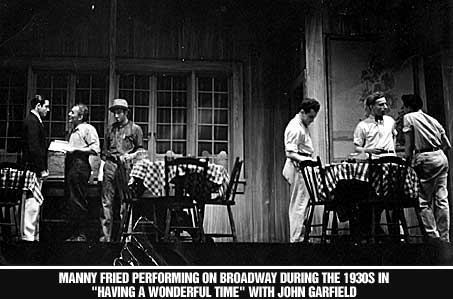 |
||
|
Fried: Yes. It's called Mishpawcha, which is a Jewish word for "family." It is a co-winner of the Helen Mintz Area Playwrights Contest, along with Rebecca Ritchie's The Crustacean Waltz. The Competition is open to all playwrights in Western New York. Rebecca Ritchie was in the playwrights' workshop that I conduct. I'm very proud of her. She is a very good playwright and I think she has a rich future. Mishpawcha
is based upon the inter-racial marriage of my brother-in-law who married
an African-American woman during the 1960s. The primary center of the
play is the dispute within the white family. In addition to the racial
aspect, it also deals with class. The family into which she marries is
a very prominent, upper class, Jewish family who own and operate the most
luxurious restaurant and cocktail lounge in the city. Something similar
to The Park Lane... here it is called The Park Regency. (Laughs). There
are differences of opinion within the family. Will there be an effect
upon the business? Will there be an effect on the mother who just had
a stroke? It is a play with deep social implications. It's narrated by
a man who was once a union organizer on the Left, and who, himself, had
difficulty being accepted into the family. |
||
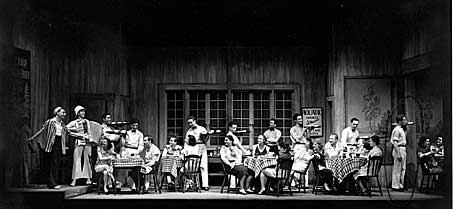 |
||
|
Fried: No, but she comes from New York City and knows more Yiddish words than the white family does. (laughs). And uses them. Surprising them. The family is like too many Jewish families, in that they are not very active in practicing their Jewishness. They do not attend a temple, they have a tree at Christmastime. Generally, it's the kind of confusion that develops in Jewish families that have been assimilated into a Christian society. That is one of the issues of the play. The major issue is the acceptance of the black woman into the family. She is a very intelligent, assertive person who is not afraid to state what she thinks. Tim White [BET's artistic director] said to me that she is the first black woman in a play written by a white man that he has ever found credible. The play is a current examination of something that happened in the late 60s and why it happened the way it did. The narrator is in the present, and he is trying to reconcile his role, or lack of role, in what happened. TPP: During the 60s, this would have been much more of an issue than it would be now. Fried: Yes. It takes place during the Civil Rights Movement. It is set in Buffalo, and people will recognize the way things were here at the time. The brother who is opposed to the marriage says that "They have already crossed Main Street." Do you know what I mean by that? "The black people have crossed Main Street! What's going to happen?" We're dealing with what actually happened in this city by emphasizing what happened in this immediate family situation. So it is a family play with major social and political implications. And economic ones too, because it all crosses class lines too. |
||
|
Fried: That was a surprise to me. I had written this play, called Triangle, some time ago. I based it, as an experiment, on Strindberg's The Stronger, in which there are two characters and one of them is not talking. And the one that wins out is the one who isn't talking. Based upon that was Eugene O'Neill's Before Breakfast in which a character talks onstage to a character offstage and what happens is that the character offstage is the one who is the most dramatic and effective. What I have here is two working class women in a town like North Tonawanda, and one of them is having an affair, and she comes to see the man's wife to try to get her to give up her husband. She talks, and the other one doesn't say a word, and the quiet one is the winner (laughs). TPP: You've been an actor and a playwright for a long time. Fried:
I started out when I was a kid. I had a teacher in high school who turned
me on to both the writing and the acting. I was in a play at the old Studio
Theatre on Lafayette. I did bit parts there. I also acted with the old
Teck Theatre Stock Company too. I went to work at DuPont and met a guy
from the University of Iowa who told me that they had the best theatre
department in the country. And I got a football scholarship and went there
for one year and spent most of my time in the theatre. I returned to Buffalo
for awhile, and then took off for New York. I was a redhead and so I was
very fortunate. Whenever there was a play with a lot of young guys in
it, I would get a part. |
||
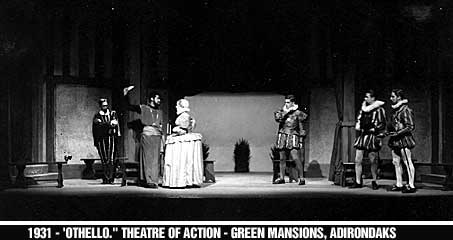 |
||
|
I acted with The
Theatre of Action, also the Theatre Union at the Civic Repertory Theatre
where I performed for Unions. I wrote several short plays that were done
Off-Off Broadway. I was also on the verge of going to Universal Studios.
A scout told me after I played the lead in The Young Go First,
"One more and I'll take you out to Hollywood." Then things were
slow and I came back to Buffalo, and I was given a scholarship to play
football for Canisius. After a season I went back to New York and they
said "Where the hell were you? (laughs) We were looking for you!"
If I had been there, and played the lead in a Gorky play, I could have
gone to Hollywood. |
||
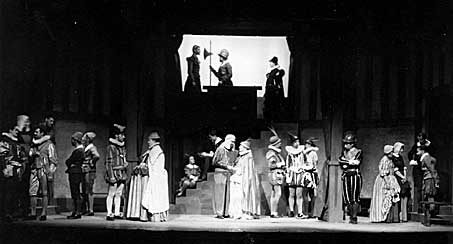 |
||
|
Fried: I didn't play on Broadway, I did it at the Brooklyn Academy. I played the punch-drunk fighter in Golden Boy. I played in Waiting For Lefty here, maybe ten years ago. Saul Elkin (actor and artistic director for Shakespeare in Delaware Park) directed, if I'm not mistaken. I was in several plays on Broadway and then there was a notice at the New Theatre League, which coordinated worker's theatres throughout the country - there was a string of them back then in the late 30s - and they wanted a director to come back here to Buffalo to direct the Buffalo Contemporary Theatre. And so I thought what the hell, things are slow right now so I came back home. The theatre came
apart about 1941 at the start of World War II. People were being drafted
and I figured that I was going to be next. I went to work at Curtiss Aircraft.
And because I could talk I became the head of the volunteer organizing
committee to organize a Union. Got fired for Union activity, and then
became a Union organizer for the next sixteen years. |
||
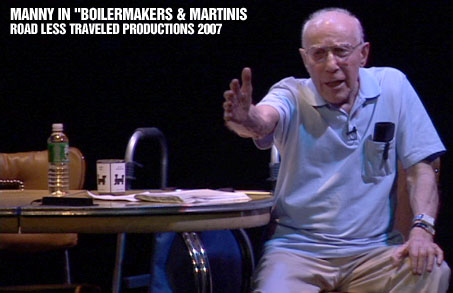 |
||
|
I never abandoned
my writing. Though for awhile I abandoned acting. I wrote a short story
each week for years for the Buffalo Union Leader. And I was writing dramatic
and educational sketches for the Union. And then I got forced out of the
Union after being called before the House Un-American Committee in 1954.
I then seriously tackled writing plays and I wrote a whole series of plays
very quickly, including The Dodo Bird, Drop Hammer, Elegy for Stanley
Gorski, and Cocoon. And an old play that I wrote in '39 won
the New American Playwrights Award and I was launched on my play writing
career. I sold life insurance during my blacklisted period, and then started acting again with the Studio Theatre in the 60s. I played Judge Brack in Hedda Gabler, Brutus in Julius Caesar. By then, a man who was a key guy in the Studio Theatre, and later became chairman of the board, lowered the boom because I had once organized his factory and struck it three times. (Laughs). He made it quite clear that as long as he was chairman of the board that I would never act there. |
||
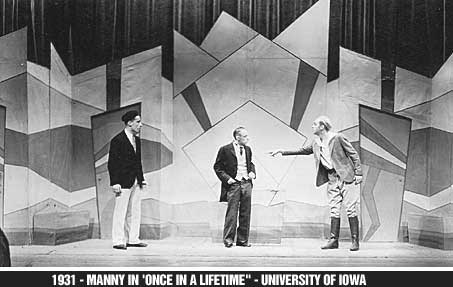 |
||
|
I had five plays that were done Off-Broadway altogether. Some got good reviews, and one got murdered. I was told "Wrong timing, Manny, wrong timing." Nixon had just talked reconciliation, and so I thought the time was right for this play that was about the interference of the FBI in people's lives. And the week we opened, Spiro Agnew came out and called all these people of the Left "intellectual slobs." The FBI was visiting people, telling them to drop out of the play.
|
||
|
The position I took was Einstein's advice by the way. I got a letter from him, congratulating me for having taken that position. Which he had advocated. Yes, I was once a member of the Communist Party. Back in the late 30s, when I was a member of Actors' Equity, there were many Leftist members and they were making things happen. That was when I joined the Party. After World War II, I drifted away from it. That was more than 50 years ago, and they've hammered me with that ever since. (laughs) TPP: What were you reasons for joining? I remember in the movie Reds that all the artists saw it as something romantic because of the October Revolution - Fried:
No it wasn't the Revolution, it was what we were doing here! We
were organizing Union working people, we were fighting for Social Security,
for unemployment insurance. Our concern, at least the Communists that
I knew, was that we were getting more money for working people to live
better. Period. They were dedicated. They were willing to sacrifice their
own personal financial situation for it. I was offered all kinds of jobs
to buy me over. I was dedicated in principle to the interests of the working
people. I know that I raised the standards of living for thousands of
people in Tonawanda and North Tonawanda. People tell me that even now. |
||
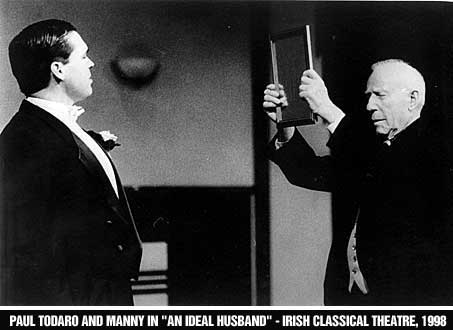 |
||
|
TPP: They went after the Arts a lot, didn't they? Fried: They felt that artists were the most dangerous because they reached so many people. TPP: And made people think. Fried: Right. In the 50s, Nixon said that the Arts are Communist and the Arts are Jewish. A high percentage of those called before the Committee were Jewish. Far beyond their presence in the Left. There was no question that there was an Anti-Semitic thing to it. They went after Mayer and Selznick and all these guys in the movies just because they were Jewish, and to get them the hell out of the leadership of Hollywood. TPP: When did that climate finally calm down? Fried: Only recently. People don't realize how recently. TPP: As in like the last ten years? Fried: That's too long a gap back. More like five years. TPP: The aftermath of the Un-American Committee in the 1950s was still haunting people five years ago? Fried: Yes. I'm still occasionally red-baited now in the labor movement. Although the major leadership has gotten away from that, there still are certain elements of it. There's no question that this lasted much longer than people realize. Much longer. TPP: Did you have any problems getting your plays produced here in Buffalo? |
||
|
|
||
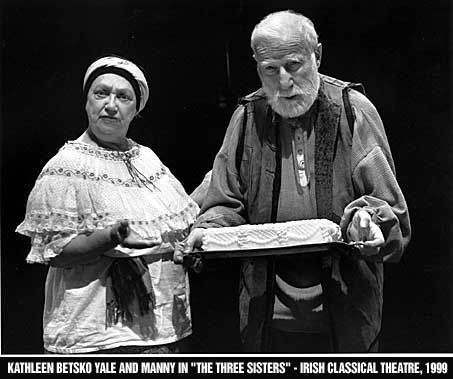 |
||
|
TPP: Any favorite roles over the years? Fried: One of the best performances that I ever gave was the lead in Arthur Miller's All My Sons for a UB show at the Pfeifer. Also the Archbishop in Moll that I did for Irish Classical Theatre. I also liked my role in Da at the Irish Classical. Also Broadway Bound at Artpark. And the old guy Soren in The Seagull. It was the first time I ever let my beard grow. When I did Cabaret with Summerfare (now Musicalfare), Randy [Kramer] insisted "Manny, you can sing. Just do it!" TPP: Did you enjoy doing Golf With Alan Shepard? It was a pleasure seeing you and Saul Elkin and Laverne Clay all together in starring roles at Studio Arena. [note: Studio Areana, at the time, had a history - annoying to many Buffalo theatregoers- of using out-of-town equity actors instead of employing local talent. This particular play was a rare exception.] Fried: I think it was proven in 12 Angry Men that the Buffalo actors are on the same level of competence as the guys they were bringing in. We get more experience.We act more. The Broadway actors are lucky if they get a show a season, and we act in one show after another. If I had been in New York I would have never done as many plays as I have here.
Click here for a review of Manny's one man play, Boilermakers and Martinis. For those who interested
in more about this fascinating gentleman, a number of archives by, and
about, Manny Fried can be found at: |
||
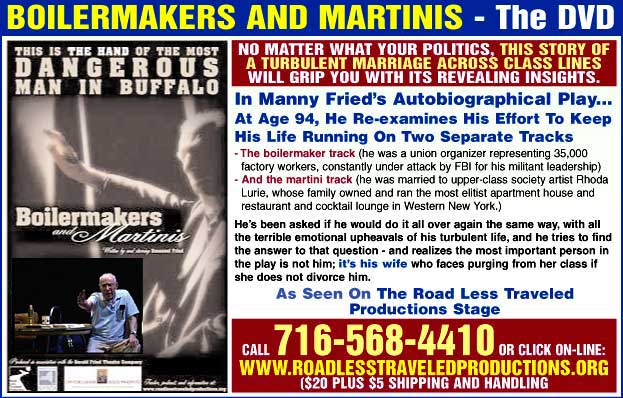 |
|
|
|
BOILERMAKERS AND MARTINIS - The DVD In Manny Fried's autobiographical play, he re-examines his effort to keep his life running on two separate tracks - the boilermaker track (he was a union organizer representing 35,000 factory workers constantly under attack by the FBI for his militant leadership) - and the martini track (he was married to artist Rhoda Lurie whose family owned and ran the most elitist apartment house and restaurant and cocktail lounge in Western New York – she was part of the upper-class society.) He's been asked if he would do it all over again the same way, with all the terrible emotional upheavals of his turbulent life, and he tries to find the answer to that question - and realizes the most important person in the play is not him; it's his wife who faces purging from her class if she does not divorce him. CRITICAL
ACCLAIM FROM CRITICS: MARRIED
ACROSS CLASS LINES. TURBULENT
LOVE STORY: WON'T
ABANDON WORKING CLASS FRIENDS: "A
MUST SEE" |